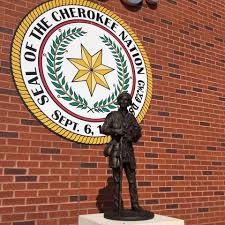
- Details
- By Chuck Hoskin Jr
Guest Opinion. The Cherokee people are deeply connected to the land and historic locations across our reservation in northeast Oklahoma. Decades before statehood, Cherokees built the first schools, courthouses, modern roads and more in this place. The historic sites on our reservation are a testament to the resilience of the Cherokee people, who built thriving new communities from scratch after our removal on the Trail of Tears.
Cherokee Nation is committed to celebrating and preserving those historically significant sites. They are vital reminders of our history, and we must preserve them to honor the accomplishments and sacrifices of our ancestors and to educate future generations.
I recently signed new legislation that commits $1 million to preserve places of significance in Cherokee history, as well as to commission official biographies and historical publications. I appreciate the Council of the Cherokee Nation for unanimously supporting the proposal for the Cherokee Nation Historic Places Preservation Fund put forward by Deputy Chief Bryan Warner and myself.
The new fund will support restoration and maintenance of properties listed on the Cherokee Nation Registry of Historic Places. The registry currently lists 16 sites that are important to our tribe and for all Oklahomans, as they are part of our state’s collective history. The new law, which amends the Cherokee Nation Registry of Historic Places Act of 2019, creates a dedicated funding stream by transferring $1 million of existing cultural review revenue. Going forward, the fund will receive annual proceeds of agriculture and business leases of up to $1 million per year. The new fund will also receive 50 percent of fines collected for violations of the Historic Registry Act.
By investing in historic preservation, we are also creating opportunities for economic development and cultural tourism. Visitors from all over the globe travel to our 7,000-square-mile reservation to learn about Cherokee culture and history. These sites create opportunities for meaningful experiences and a better appreciation of Cherokee culture.

Our efforts to preserve our history are not limited to physical restoration of these sites. We also know it’s important to share the stories associated with them. The exhibits and programs developed by our Cultural Tourism division provide that deeper understanding of Cherokee culture and history. The expanded law also authorizes the Secretary of Natural Resources’ office to commission official biographies of former Principal Chiefs and official histories of the tribe’s legislative and judicial branches.
We recently added the Little Flock Baptist Church in Nowata County to the historic registry. Cherokee Freedmen and others in the community formed the congregation in 1887. Built in the early 1900s, the church was a center of religious, educational, and cultural life for the surrounding Cherokee Freedmen community for more than 100 years. The structure showcases the unique stone masonry work commonly found in Cherokee Freedmen communities.
Knowledge of our history is a great inspiration for our lives today. We cannot understand the present without knowing how we got here, including both the highs and the lows. The darker parts of history can sometimes make us uncomfortable, but it is foolish to flinch away. Instead, we must be open to the whole story, to build on the successes of our ancestors and to learn from their mistakes.
Chuck Hoskin, Jr. is the principal chief of the Cherokee Nation.
More Stories Like This
The Absence of October's Job Report Shows Why Native American Communities Need Better DataTribal IDs Are Federally Recognized. ICE Agents Are Ignoring Them.
Thanksgiving: Part of "Broken Circle Holiday"
Thanksgiving is a Tradition. It's Also a Lie
Decisions About Us, Without Us: Education Dismantling Ignores Tribal Nations
Help us tell the stories that could save Native languages and food traditions
At a critical moment for Indian Country, Native News Online is embarking on our most ambitious reporting project yet: "Cultivating Culture," a three-year investigation into two forces shaping Native community survival—food sovereignty and language revitalization.
The devastating impact of COVID-19 accelerated the loss of Native elders and with them, irreplaceable cultural knowledge. Yet across tribal communities, innovative leaders are fighting back, reclaiming traditional food systems and breathing new life into Native languages. These aren't just cultural preservation efforts—they're powerful pathways to community health, healing, and resilience.
Our dedicated reporting team will spend three years documenting these stories through on-the-ground reporting in 18 tribal communities, producing over 200 in-depth stories, 18 podcast episodes, and multimedia content that amplifies Indigenous voices. We'll show policymakers, funders, and allies how cultural restoration directly impacts physical and mental wellness while celebrating successful models of sovereignty and self-determination.
This isn't corporate media parachuting into Indian Country for a quick story. This is sustained, relationship-based journalism by Native reporters who understand these communities. It's "Warrior Journalism"—fearless reporting that serves the 5.5 million readers who depend on us for news that mainstream media often ignores.
We need your help right now. While we've secured partial funding, we're still $450,000 short of our three-year budget. Our immediate goal is $25,000 this month to keep this critical work moving forward—funding reporter salaries, travel to remote communities, photography, and the deep reporting these stories deserve.
Every dollar directly supports Indigenous journalists telling Indigenous stories. Whether it's $5 or $50, your contribution ensures these vital narratives of resilience, innovation, and hope don't disappear into silence.
 The stakes couldn't be higher. Native languages are being lost at an alarming rate. Food insecurity plagues many tribal communities. But solutions are emerging, and these stories need to be told.
The stakes couldn't be higher. Native languages are being lost at an alarming rate. Food insecurity plagues many tribal communities. But solutions are emerging, and these stories need to be told.
Support independent Native journalism. Fund the stories that matter.
Levi Rickert (Potawatomi), Editor & Publisher
